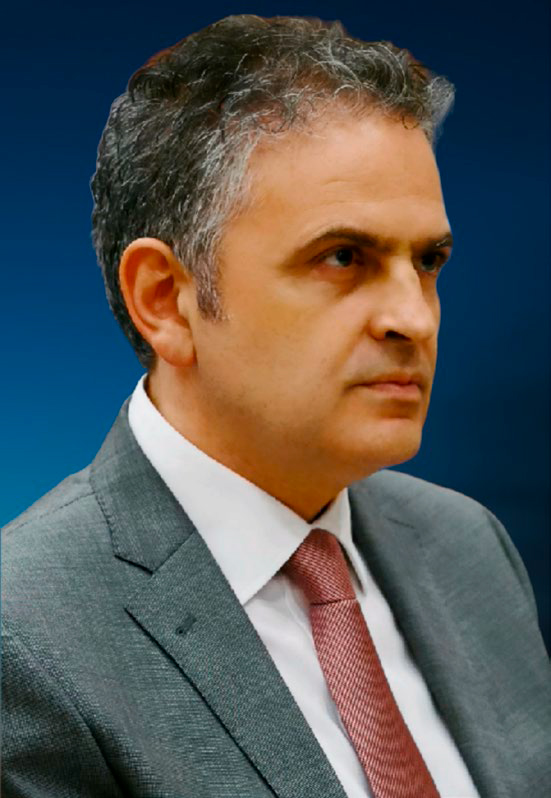
Interview with Mr. Nikolaos Noulas, President of the Mission Council in Greece

Mr. Nikolaos Noulas is the head of the animation and management bodies of the Marist mission in Greece. In this capacity, he also participates in the Mission Council of the Province of the Hermitage, where he shares responsibilities with the leaders from France, Catalonia and Hungary. He has been President of the Marist Mission Council in Greece (Σ.Μ.Α.ΕΛ) since 2021.
Born in Athens, Nikolaos is married and has two children. He was a student at the Marist school Leonteios Athens, where he has been working since 1997. He is a teacher of Greek literature, history and philosophy. From 2014 to 2017, he was deputy headmaster of the school, and then headmaster.
We reproduce below the interview published in issue 157 of the provincial bulletin “L’Hermitage.info”.
You are the president of Σ.Μ.Α.ΕΛ. What is the scope of this body ?
Σ.Μ.Α.ΕΛ. aims to ensure the Christian identity of the Marist works in Greece, which is expressed and fostered through Marist values and principles. It ensures the cultivation of the Marist charism among all involved in our mission within the Marist works in Greece. It works closely with Marist leaders in Greece, especially their sense of mission. It establishes and ensures the principles that allow Σ.Μ.Α.ΕΛ. to observe and analyse what is happening so as to be fully aware of situations needing urgent attention.
The Marist Institute is embedded in the Catholic Church which is very much in the minority in Greece. Does this present any disadvantages for you? How are your relations with the Orthodox Church? Is it easy for you to organise pastoral activities ?
Catholics in Greece are a small minority. Despite this, the Marist schools in Greece are well respected by Greek society and also by the Orthodox Church. For example, the last two Greek Orthodox archbishops are linked with the Marists: one as a former student and the other as a teacher. So, there is great confidence in Marist education and the parents of our students value and welcome our ideas and initiatives concerning pastoral care.
Leonin High School has two schools. Could you tell us something about each one? Let’s start with Athens-Patissia. What are the characteristics of this school?
There are two Marist schools in Greece. One is located in Athens, in the Patissia district. Tracing its establishment back to 1924, it is an historic school for the capital, but also for the whole of Greece. Now it is the largest school in the city of Athens. Patissia is a middle class neighbourhood.
Nea Smyrni is the other school, located in another part of the city. Can you give us an overview of the features of this school?
The establishment in Nea Smyrni is more recent. It was opened in 1963 in a suburb where families with higher incomes reside.
What is the relationship between the two schools? Does each go its own way or do they act in a fully integrated way, be it at the level of teachers, families and even pupils?
Relations between the two schools have always been very good, but during the last ten years they have also travelled down a common path. Of course, each school can take its own initiatives, but for all important matters there is close cooperation on the essentials.
Within their residence, the brothers run a Greek language learning centre, “Agia Kyriaki”. What does this social work do? Who are its main beneficiaries?
The “Agia Kyriaki” centre is dedicated to learning the Greek language. Its target group is economic immigrants. For the last two years, the centre has stopped functioning because of the pandemic but we hope that it can now restart.
The other social outreach is Acharnés. What is its purpose and who does it serve? Do the teachers from either school get involved?
The aim of the Acharnes social centre, “A Heart that knows no bounds”, is to help children from quite poor and often immigrant families. We help them to study their school lessons, but also to socialise and to integrate better easily into Greek society.
How have Marist works (school and social) coped with the difficulties caused by the pandemic?
We have adjusted to this difficult situation. We respected Greek law and offered our educational services in a virtual way. We faced up to this situation with realism, availability and hard work. We have greatly improved the technological services of our schools and, through digital lessons, we have motivated our students with a spirit of hope and optimism.
Can you describe the most outstanding elements of the Marist presence in Greece, starting from when three brothers from Constantinople settled in Lesbos in 1901 and, years later, settled in Athens, up to the present day?
The Marist presence in Greece is connected in peoples’ minds with a high quality education: it is a holistic education, which transmits values, as well as helps the children to acquire knowledge. On the other hand, the Marist Brothers have developed an expansive style of education which has given the Marists in Greece a great reputation. Then, there is always the family spirit of Marist schools which contributes to good relationships between teachers, students and their parents.
You are a member of the Province Mission Council. How do you reconcile unity across the Province with the diversity of its countries, languages and cultures?
For the Province Mission Council, diversity is not only a challenge but also a richness. We focus on listening to each other and respecting each other’s pace. In any case, Marist values are our common ground, and they also have a universal quality.
